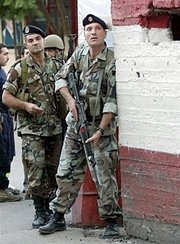 Ain al-Hilweh camp, Lebanon - Tension was obvious at the entrance of the Palestinian refugee of Ain al-Hilweh camp between the Lebanese army and members of fundamentalist groups holed inside the camp after repeated clashes for the past two days. Lebanese army soldiers wearing helmets and bullet-proof vests were on full alert at the entrance of the Palestinian camp in southern Lebanon that houses around 75,000 refugees. The latest clash took place late Wednesday when a fundamentalist gunman was killed and a Lebanese army officer wounded in a shootout near the entrance of the camp which is located at the outskirts of the southern port city of Sidon. Security sources in south Lebanon said the incident occurred when three assailants in a white Renault Rapid opened fire on the soldiers as they tried to make their way through an army checkpoint at the western entrance to the camp. They said army troops returned fire wounding one gunman, Issa Qiblawi. The second gunman was arrested while the third fled, the sources said. But Qiblawi died of his wounds soon afterwards. "The vehicle drove past the checkpoint and when troops fired warning shots, they were shot at and an exchange of fire developed," a witness said. A Palestinian official at Ain al-Hilweh said the three attackers were members of the Islamic grouping Jund al-Sham and Issa Qiblawi was the brother of Sheikh Qiblawi, killed in 2004 in Iraq while fighting for al-Qaeda. The shootout came almost two weeks after a would-be suicide bomber was shot and killed by Lebanese soldiers as he tried to detonate an explosives belt at a checkpoint on the edge of Ain al-Hilweh. A Palestinian official has said the suspect killed on May 31 was most likely a Saudi citizen.
Ain al-Hilweh camp, Lebanon - Tension was obvious at the entrance of the Palestinian refugee of Ain al-Hilweh camp between the Lebanese army and members of fundamentalist groups holed inside the camp after repeated clashes for the past two days. Lebanese army soldiers wearing helmets and bullet-proof vests were on full alert at the entrance of the Palestinian camp in southern Lebanon that houses around 75,000 refugees. The latest clash took place late Wednesday when a fundamentalist gunman was killed and a Lebanese army officer wounded in a shootout near the entrance of the camp which is located at the outskirts of the southern port city of Sidon. Security sources in south Lebanon said the incident occurred when three assailants in a white Renault Rapid opened fire on the soldiers as they tried to make their way through an army checkpoint at the western entrance to the camp. They said army troops returned fire wounding one gunman, Issa Qiblawi. The second gunman was arrested while the third fled, the sources said. But Qiblawi died of his wounds soon afterwards. "The vehicle drove past the checkpoint and when troops fired warning shots, they were shot at and an exchange of fire developed," a witness said. A Palestinian official at Ain al-Hilweh said the three attackers were members of the Islamic grouping Jund al-Sham and Issa Qiblawi was the brother of Sheikh Qiblawi, killed in 2004 in Iraq while fighting for al-Qaeda. The shootout came almost two weeks after a would-be suicide bomber was shot and killed by Lebanese soldiers as he tried to detonate an explosives belt at a checkpoint on the edge of Ain al-Hilweh. A Palestinian official has said the suspect killed on May 31 was most likely a Saudi citizen. have links with Al-Qaeda have settled in Lebanon's Palestinian refugee camps in recent years, especially in Ain al-Helweh, which is partly controlled by Jund al-Sham.
The camps are outside the control of Lebanese authorities, with Palestinian factions in charge of security.
The latest violence comes as Lebanon seeks to form a new government of national unity following a deal to end an 18-month political crisis that brought the country to the brink of a new civil war.